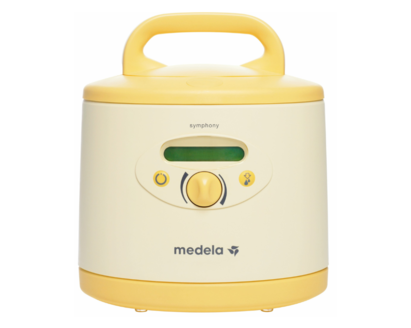
Hands-free Electric
Hands-free breast pumps feature in-bra collection cups for multi-tasking and an internal rechargeable battery, so you don’t have to be plugged into a wall while using. Choose from single or double cups.

Classic Electric
Our electric breast pumps feature 2-Phase Expression technology, which mimics babies’ natural sucking rhythms, allowing mums to express more breast milk in less time.

Manual
Single manual breast pumps are perfect for mums who express occasionally and need a lightweight travel companion.

Symphony - No 1 Hospital Pump
Medela Symphony is a reliable, multi-user breast pump for hospitals and home rental, ideal for long-term and frequent pumping.


Sign-up to Newsletter
Welcome to the Medela Family Newsletter, your gateway to the vibrant world of breastfeeding. Join our community to explore breastfeeding resources, receive invaluable support, access exclusive promotions, and expand your knowledge on breastfeeding and early parenting.

Medela Family App
The Medela Family app by Medela helps you track your baby’s key activities, provides expert tips and helps you get the right products for your breastfeeding needs.

Sign-up to Newsletter
Welcome to the Medela Family Newsletter, your gateway to the vibrant world of breastfeeding. Join our community to explore breastfeeding resources, receive invaluable support, access exclusive promotions, and expand your knowledge on breastfeeding and early parenting.

Medela Family App
The Medela Family app by Medela helps you track your baby’s key activities, provides expert tips and helps you get the right products for your breastfeeding needs.

Hands-free Electric
Hands-free breast pumps feature in-bra collection cups for multi-tasking and an internal rechargeable battery, so you don’t have to be plugged into a wall while using. Choose from single or double cups.

Classic Electric
Our electric breast pumps feature 2-Phase Expression technology, which mimics babies’ natural sucking rhythms, allowing mums to express more breast milk in less time.

Manual
Single manual breast pumps are perfect for mums who express occasionally and need a lightweight travel companion.

Symphony - No 1 Hospital Pump
Medela Symphony is a reliable, multi-user breast pump for hospitals and home rental, ideal for long-term and frequent pumping.

Pump In Style® Hands-free Double Electric Breast Pump
Pump In Style® Hands-free double electric breast pump provides you with a superior hands-free experience while still delivering trusted hospital performance.

Symphony PLUS® breast pump
Engineered with Initiation Technology™ proven to help mothers initiate, build, and maintain their breast milk supply






























